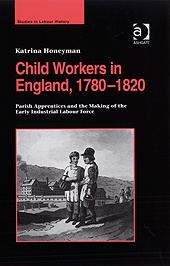Child Workers in England, 1780–1820 Parish Apprentices and the Making of the Early Industrial Labour Force
Auteur : Honeyman Katrina

Date de parution : 10-2007
15.6x23.4 cm
Date de parution : 11-2016
15.6x23.4 cm
Thème de Child Workers in England, 1780–1820 :
Mots-clés :
parish; apprentices; clement; dane; factory; apprenticeship; st; pancras; water; spinners; Parish Apprentices; Parish Factory Apprentices; Young Men; St Paul Covent Garden; Early Industrial Labour Force; Quarry Bank Mill; Factory Apprentices; St George Hanover Square; St Mary Newington; St Clement Danes; St James Piccadilly; St Pancras Parish; Cressbrook Mill; St James Parish; St Leonard’s Shoreditch; Litton Mill; Royal Military Asylum; Westminster Archives Centre; Parish Apprenticeship System; Birmingham Board; Birmingham Guardians; London Parishes; Early Textile Factories; Kidderminster Carpet Weavers; Large Families



